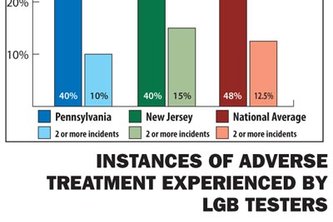Days after the ribbon cutting for Philadelphia’s LGBT-friendly senior residences, a study was published that revealed LGB older adults across the country, including in Pennsylvania and New Jersey, are facing discrimination in housing.
The Equal Rights Center, along with Services and Advocacy for GLBT Elders, late last month released “Opening Doors: An Investigation of Barriers to Senior Housing for Same-Sex Couples,” a study that examined housing discrimination within the LGBT older-adult community.
The Gill Foundation and the Retirement Research Foundation funded the study.
Researchers undertook the study in light of the widening income gap and decreasing resources for LGB elders — and chief among the study’s findings was that 40 percent of LGB seniors in a controlled study experienced negative treatment from senior-living facilities in both Pennsylvania and New Jersey.
The study involved 200 “tests,” in which both a heterosexual and LGB couple contacted independent-living, continued-care and assisted-living facilities to inquire about residency, and researchers measured if there were differences in how the couples were treated. Facilities were questioned about their rental prices, deposits and fees, amenities and specials and the application process.
The 10 states included in the study, which ran from April-November, were Arizona, Colorado, Florida, Georgia, Michigan, Missouri, New Jersey, Ohio, Pennsylvania and Washington.
In 48 percent of the tests the same-sex couple was treated differently, in a negative way.
In Pennsylvania, 40 percent of testers, or eight of 20, experienced at least one form of adverse treatment; 10 percent experienced more than one. In two instances, the LGB tester was offered fewer units than the heterosexual counterpart, while in another the heterosexual tester was given information about additional units at an adjoining property. One tester was given a rental range in which the lowest rate was $100 higher than the lowest rate given to the heterosexual testers.
In three tests, the facility told the LGB individuals about a deposit or fee — including one instance of a security deposit and application fee that totaled $4,500 — that was not required of the heterosexual.
Ted Martin, executive director of Equality Pennsylvania, which assisted in recruiting testers, said the study points to the need for HB 300, legislation that would add sexual orientation and gender identity to the list of classes protected from discrimination in housing, employment and public accommodations.
“This is evidence that discrimination exists in Pennsylvania, and this is why it is critical that we pass the nondiscrimination act that includes housing,” Martin said.
In New Jersey, 40 percent of testers also experienced at least one form of adverse treatment, while 15 percent saw more than one instance.
Garden State Equality assisted in promoting the study to LGB older adults. “We have known anecdotally that seniors are facing this type of barrier to find appropriate housing now that they are making these kinds of choices and heard that from a couple sources in New Jersey,” said GSE interim executive director John Mikytuck. New Jersey was one of three states included in the study that does have statewide protections against housing discrimination based on sexual orientation.
“It is very subtle discrimination,” Mikytuck said. “We have to ensure our laws in New Jersey are being enforced so there can be no subtly and obvious discrimination. Discrimination is discrimination.”
Although the Fair Housing Act prohibits discrimination based on race, color, religion, national origin, sex, disability and familial status, federal law does not prohibit housing discrimination against LGBT citizens in the private-housing market.
The study included a number of recommendations to remedy the discrimination it found, such as the passage of LGBT-inclusive nondiscrimination laws, stricter enforcement of already-existing laws, adoption of nondiscrimination policies at senior providers, enhanced awareness among seniors about their rights and resources and further research on the topic.
Mikytuck said GSE will do its part to keep attention on the issue.
“If there are solutions that involve raising awareness, we plan our educational role in that,” he said. “There are a lot of ways to address issues in this but doing nothing is not the answer: Educating people will be what we do today.”
For more information on the study, visit www.equalrightscenter.org.
